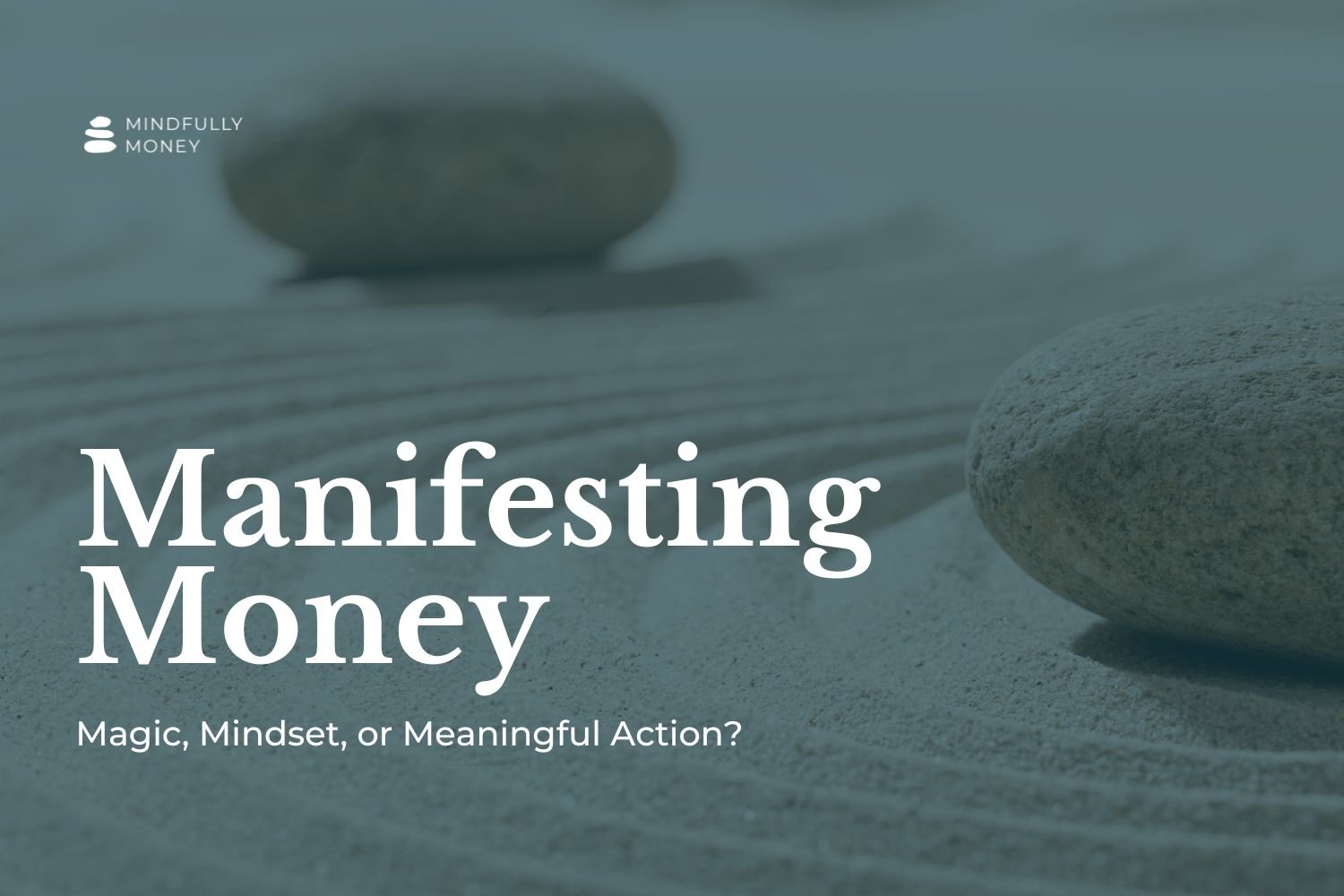Manifesting Money: Magic, Mindset, or Meaningful Action?
Can you manifest money, wealth, and abundance? Some people certainly think so.
The idea is that your thoughts, hopes, and desires can change your reality—that you can simply “think” your way to wealth and abundance (or whatever you want to manifest in your life). This follows the law of attraction, which says you can attract positive things into your life if you just think enough positive thoughts.
Although this may sound a bit ridiculous to many of us (myself included), these principles have found their way into many popular self-help money books.
Think and Grow Rich by Napoleon Hill, originally published in 1937, advises readers to envision themselves already in possession of money every morning and night.
Jen Sincero’s bestselling book You Are a Badass at Making Money (2018) says you can get rich by changing your thoughts, believing you’re worthy of financial freedom, and focusing on abundance.
Early on, my response to things like this was skepticism and eye-rolling. After all, you can’t just “think” things into existence as though you’re waving a magic wand.
And clearly, there are many things in the world that no amount of positive thinking can change. (If only there were a way to “think” lower egg prices into existence…)
Saying that you can change everything just through manifestation ignores the very real effects that societal, economic, cultural, and political forces have on our everyday circumstances. It leads to the same “pull yourself up by your bootstraps” mentality that tells some people to work harder, while ignoring the fact that the company that made you rich refuses to pay those people a living wage.
So yes, thinking that everything is just a matter of personal responsibility and you can change everything by wanting it hard enough is dangerous.
However, I’ve come to see that manifestation isn’t all a bunch of woo-woo nonsense. No, you can’t simply think about abundance and magically get rid of your debt.
While I don’t believe you can simply wish your way to wealth, I’ve come to see that some of these ideas—when grounded in action—can be genuinely helpful. There’s a middle path between magical thinking and total skepticism, and that’s where real change can happen.
So here are some aspects of this advice that we could all use:
1. What You Pay Attention to Matters
I’ve had plenty of times in my life when my strategy was to ignore problems I didn’t want to deal with. Whether it was building a business, parenting, house problems, or something else, I would notice that there was a problem (or that there might be a problem). But I wouldn’t have the capacity to actually look into it, think about it, figure out what to do, and take action. So instead, I would pretend it wasn’t happening—I’d ignore it.
I’m sure you’re not surprised that none of my problems ever got solved by ignoring them.
I’ve found this to be true with my financial coaching clients too. Many of them come to me because they’ve been avoiding their finances and money problems. They know it’s bad, but figuring out what to do is scary and overwhelming. It’s easier to ignore it and focus on all the other things going on in life. It’s completely understandable.
But one of the ways financial coaching is helpful is that it forces you to actually pay attention to your money. Once you give a problem your attention, you start to think about how you can fix it, and you take action accordingly.
And that’s what I’ve learned personally as well. If I want to change something or solve a problem, it all starts by giving it my attention.
So the value in thinking about wealth and abundance isn’t that it will magically get you more money—it’s in giving a situation your attention so that you can start doing something about it.
And remember, you don’t have to do this alone. Whether it’s working with a financial coach, joining a supportive community, or finding an accountability partner, having support can make the process less overwhelming and help you stay on track.
2. You Can’t Make Something Happen If You Don’t Believe It’s Possible
Similarly, visualizing yourself as wealthy or repeating a mantra (like “I am a person who is debt-free”) isn’t enough to make it happen. But believing that it’s possible is a necessary first step.
I would never have started building a business if I didn’t first believe that it was possible for me to do so. I wouldn’t have stuck with it through the challenging early years without thinking that it would eventually work out. I would have given up long ago.
If you’re struggling with debt, living paycheck to paycheck, or not saving as much as you want, you have to first believe that it is possible to change. You have to stop thinking that you’re bad with money and will always be in debt. You have to stop thinking that the world is against you and it’s impossible to get ahead given all the things happening.
Believing it is possible isn’t the solution itself. It doesn’t work on its own. It’s not what makes change happen.
But believing it’s possible is important because it encourages your brain to move to the next step: thinking about how you can make it happen. It’s a necessary shift to help you identify the things that are in your control and focus on the steps you can take, even if everything else seems hard. Ultimately, this is what Carol Dweck and her colleagues identified as having a growth mindset—believing that skills and knowledge can always be learned and improved. A fixed mindset, on the other hand, is believing things like “I’ll never be good at money,” “I’m just someone who spends a lot of money,” or “I’ll never be able to get ahead.”
Again, thinking something is possible is only the first step, but it’s an essential one because it gives you that little push to start thinking about what you can do to make it happen.
3. Changing the Way You Think About and See Yourself Changes the Way You Act
I always used to think mantras were silly and way too woo-woo for me. And maybe in some ways, they are. But lately, I’ve been discovering that they can actually be helpful in changing the way I feel about myself and how I show up in the world.
I used to find myself frequently overcome by a sense of failure—like I was never doing enough or doing it well enough. A lot of it was driven by the busyness of life with three kids, building a business, and doing all of the regular “life” things. On top of that, I struggled with perfectionism and needing everything to be done the absolute right way before I could proceed.
This often left me paralyzed since doing everything perfectly isn’t an achievable goal. I’d frequently feel demoralized and want to give up.
I’d start thinking about how I could do better or make it work if only I could ____. In my business, I was always waiting to move forward and try the next thing until I got this one thing perfect.
The reality is that you never get to perfect, and trying to do everything perfectly the first time is the fastest way to hold yourself back from taking action, seeing what works, and making progress.
And then one day I was listening to a podcast (I’m pretty sure it was the Shameless Mom Academy—now called Shameless Leadership—with Sara Dean). Sara (if I’m remembering correctly) recommended the mantra:
“I am enough and I have everything I need.”
This resonated with me and I repeated it for well over a year as I took my first sip of coffee every morning.
It helped change my belief that I always needed to do or be more, and helped me accept that whatever I was doing was good enough. Mostly it served as a reminder that I couldn’t keep trying to make everything perfect and that I needed to accept “good enough” and move on. I didn’t need to keep learning about marketing and develop the absolute perfect marketing strategy—I just needed to actually do it.
Believing that I am enough and I already have what I need has helped get me unstuck and make progress.
And it’s not just me.
Jonah Berger, author and professor at the Wharton School, studies language and its effect on behavior. In Magic Words, he writes about how the words you use can change the way you view yourself and the way you act. For example, he points out that calling yourself a runner is much more powerful than saying that you run.
Why? Because it’s about identity and how you see yourself.
Want to stop impulse buying? Try thinking of yourself as a person who makes careful, intentional spending decisions.
Instead of thinking that you’re bad at money, repeat to yourself “I am learning to be good with money” or “I have what it takes to be good with money.”
Once you start seeing yourself that way, you increase the chance that you will act in accordance with that belief.
No, it’s not as simple as repeating a mantra and having it all come true, but it opens up possibilities and can gradually shift your actions so that you begin living out that belief.
Don’t let the assumption that thinking about something hard enough will change your reality keep you from taking action. It’s not a magic solution—it’s the start of a journey. You’ll begin by believing that something is possible, overcome the limiting beliefs that keep you stuck, identify things you can do and change, and start taking actions that will get you to that point.
Ready to Start? Here’s What You Can Do Next:
Pick one area of your finances to pay attention to this week. Maybe it’s tracking your spending, reviewing your bank statements, or just opening your bills.
Try a new, empowering mantra for a week. For example, “I am learning to be good with money” or “I have what it takes to improve my finances.”
Reflect on one limiting belief you can reframe. Write it down, then write a more empowering version next to it.
Share your goals with someone you trust. Accountability and encouragement can make a big difference.
Want to Go Deeper?
If you’d like support on your financial journey, I’m here to help! Reach out to learn more about coaching or join our community for encouragement and accountability.








